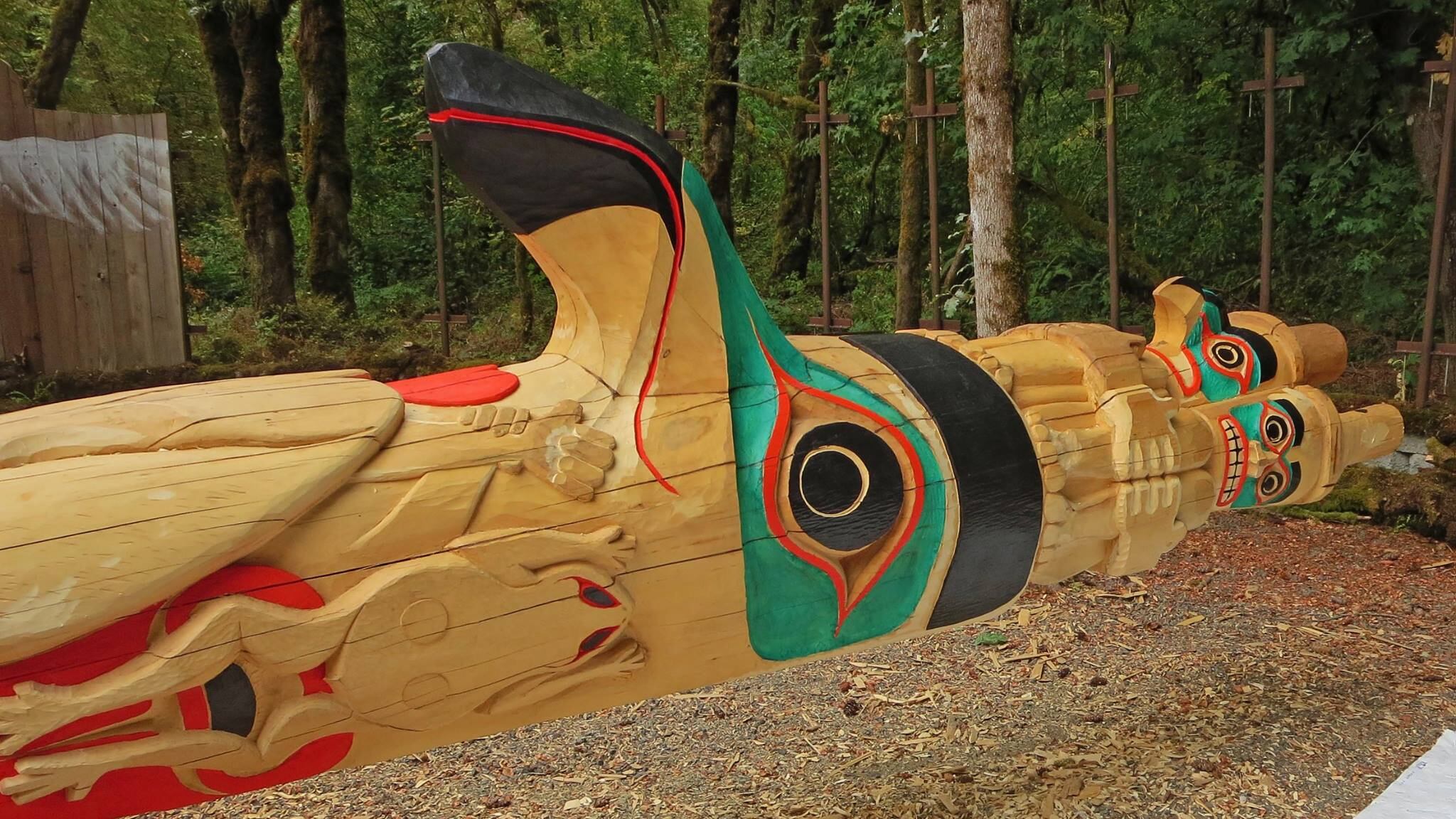A wood-carved pole at the Oregon Country Fair is receiving pushback from members of Native American tribes.
The "story pole" has been in the works for the past five years, by a group called the Flamingo Clan, who oversee the Ritz Sauna & Showers at the Oregon Country Fair.
The pole, which has been hotly debated by members of the Oregon Country Fair board and members of Native American tribes, will finally be raised this July, despite continuing objections by tribe members.
Siletz tribe member Autumn DePoe-Hughes says the pole is an "abomination."
"These are white people calling themselves part of a clan that take Northwest coastal Native American-inspired images and change them to a bit to make them their own to tell their own history," DePoe-Hughes tells WW. "It's problematic in a number of ways."
Part of the reason the pole is a problem, Depoe-Hughes says, is that it appropriates the culture of Northern Native American tribes, who weren't even the original tribes on the land that OCF takes place—the Kalapuya tribe.
"They're completely ignoring the history of the people on the land beforehand and being dismissive of the local tribes' voices on this," she says.
Depoe-Hughes, along with several other members of Native American tribes, have created a Facebook page documenting their efforts to urge OCF not to raise the pole.
Cultural anthropologist David Lewis, also a member of the Confederated Tribes of the Grand Ronde, wrote a letter to OCF stating his concerns:
Another post on the Facebook page shows a comment from a member of the OCF unofficial Facebook group from a woman in favor of the pole:
In another letter, former Oregon Country Fair board member John Parrot calls members of the Fair Diversity Task Force "zealots:"
The story pole faced controversy last year, when the Board of Directors voted to on whether or not to go forward with the raising of the story pole.
Six letters in the March 2016 "Fair Family News" monthly newsletter are in regard to the story pole; all of them are in support.
In a letter titled "My Art, My Design," the pole's artist, Brad Bolton, writes:
He goes on to write that several Native American tribe members have complimented the pole.
In another letter Ritz Sauna member Kathryn Weitz writes:
Depoe-Hughes says she had a strong reaction to the letters in the newsletter.
"It made me feel unsafe to go to Fair. It made me feel like the way that Natives have felt their entire lives it just made me feel horrible," she says. "If you speak out about [the story pole], you get a lot of abuse back and you don't want to become a pariah or lose any sort of status with Fair, and you don't want people to be mad at you for like just saying something about something that they think its just amazing."
Minutes of a March 2016 Board Meeting indicate OCF did sent a letter to the Grand Rhonde Tribe. In the letter, they asked the tribe for comment regarding the story pole.
In both the March and April 2016 meetings, board members debated the issue. In an April 2016 meeting, board member Indigo Ronlov said: "This has been one of the hardest decisions that I've faced in my eight years as a board member."
According to the minutes from this meeting, the Board "received no comments from any of the Tribes regarding the Ritz's Story Pole project other than some emails from individuals." One board member said that the tribes may not respond because they "have a lot on their plates."
Many arguments were made, including:
Another board member commented:
In this meeting, they approved the story pole 8-2, with the added caveat that an informational display be added, that would address concerns about whether the story pole is 'Culturally Inspired Art or Cultural Appropriation.' The display would also let people give feedback concerning the issues.
Now, members of the tribes are still fighting against the pole. They recently posted a number of ways you can protest the pole, including divesting from the Ritz Sauna and turning your back and shaking your head 'no' during the pole rising.
Sam Rutledge is a member of the OCF Diversity Council. Speaking only personally, he says that he doesn't think the pole should be raised.
He mentioned that there is a new piece in the OCF Community Agreement that talks about cultural appropriation and cultural sensitivity, but feels that many of the responses to the criticism of the story pole have been dismissive.
"These questions about culture and about colonialism and cultural appropriation have been surfacing more and more than I've ever seen before," he says. "I think that that has really sparked a conversation in the fair community about what is appropriate and think it's really healthy, although at times people have said things that aren't really healthy."
When asked about OCF Board Members defending the pole as "a blending of cultures," Rutledge explained, "it's so hard because in an ideal world outside of the context of hundreds of years of genocide and colonial oppression that would probably be a really good way to move forward—but that's not where we're at."
Rutledge says he'd like to see a solution other than raising it, like leaving it down, but having a plaque that explains why it shouldn't be raised.
Depoe-Hughes says she'd like for the pole not to be raised, and that she wants people to understand what this means for members of Native American tribes.
OCF sent WW this statement regarding the story pole:
